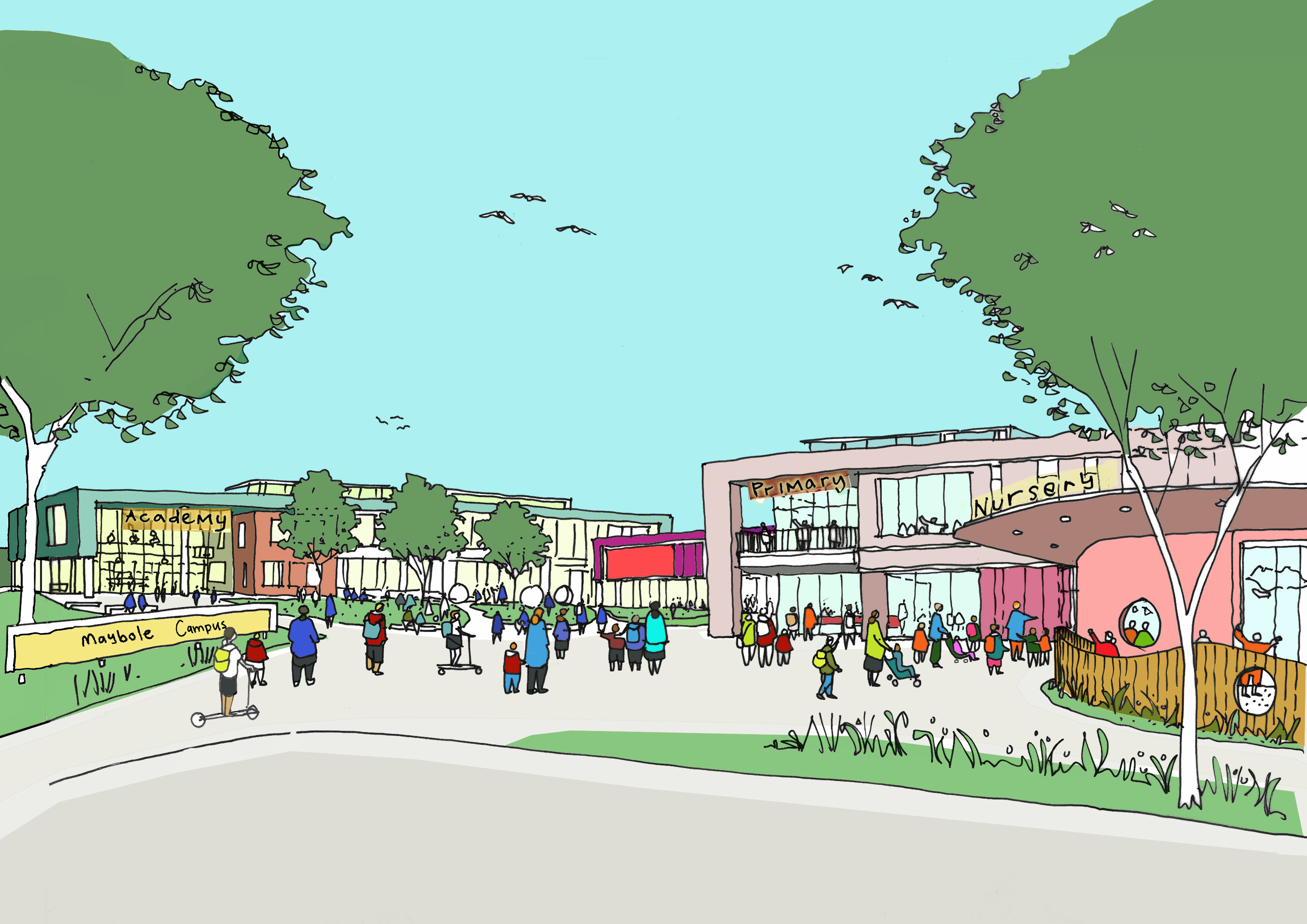Government details first phase of £1bn school building programme
The Scottish Government has unveiled the schools that will be rebuilt in the first phase of its new £1 billion programme.

Plans for Maybole Community Campus
Funding of between £220 million and £275m will be contributed in partnership with local authorities across the country to replace 26 schools from Aberdeenshire to Ayrshire, with a further phase of investment to be announced within 12 months.
The £1bn Learning Estate Investment Programme was announced in November 2018 and the first phase of the programme will new schools in:
- Aberdeenshire – a new Peterhead Community Campus including replacements for Dales Park Primary School, Meethill Primary School, Peterhead Academy and Anna Ritchie School
- East Lothian – a new Wallyford High School and Whitecraig Primary School
- East Renfrewshire – replacements for Neilston Primary School and St Thomas’ Primary School
- Edinburgh – a new Currie Community High School
- Eilean Siar – a new Castlebay Campus to replace Castlebay High School, Castlebay Primary School and Eoligarry Primary School
- Fife – a new replacement school for Woodmill and St Columba’s High Schools, part of the development of a new community campus
- Highland – a Tain 3-18 campus including replacements for Tain Royal Academy, Knockbreck Primary School, Craighill Primary School and St Duthus School
- Midlothian – a replacement for Beeslack Community High School
- North Ayrshire – a new Ardrossan Community Learning and Innovation Hub to replace Ardrossan Academy and Winton Primary School
- South Ayrshire – a new Maybole Community Campus, to replace Carrick Academy, Cairn Primary School, Gardenrose Primary School and St Cuthbert’s Primary School
- West Lothian – new Beatlie Additional Support Needs Campus
The announcement comes as the Office for National Statistics showed the proportion of schools in good or satisfactory condition increased from 61.1% in April 2007 to 88.3% in April 2019. The School Estates Statistics 2019 also showed that the proportion of pupils educated in these good or satisfactory condition schools has hit a record of 89.6%, up from 60.8% in 2007.
Tackling the climate emergency is central to Scotland’s new Learning Estate Strategy, with lessons learned from previous education infrastructure projects informing future construction to create low carbon digitally-enabled schools and campuses. Scottish Futures Trust will manage the programme on behalf of the Scottish Government.
Several of the projects bring together nurseries, schools - including specialist centres for pupils with additional support needs - colleges and universities in multi-purpose campuses for pupils aged from three to 18, with additional facilities that benefit surrounding communities.
The first projects in this phase could open as soon as 2022-23.
First Minister Nicola Sturgeon said: “This additional £1bn investment will benefit around 50,000 pupils across Scotland, with the first phase set to upgrade and modernise schools across 11 of our local authority areas.
“This investment builds on the progress that we have made over the last ten years. The National Statistics published today reveal that, even before today’s announcement, Scotland’s school estate has never been in better condition, with a record percentage in good or satisfactory condition. That is a result of sustained investment and we will now build on that.
“Modern, state of the art buildings can make a real difference to the lives of pupils, teachers and parents, as well as the wider communities they serve. This investment continues our efforts to improve the condition of our entire learning estate, from early years through to schools and colleges.”
Education secretary John Swinney said: “Creating and maintaining high quality, fit for purpose educational facilities demonstrates to pupils, teachers, staff and the community how valuable learning is.
“The progress made through Scotland’s Schools for the Future has had a significant impact on the condition of schools across the country - almost 90% of pupils are learning in schools in good or satisfactory condition.
“We are committed to making even more progress and I have seen myself the urgency with which some schools require updating. The first phase of the £1 billion Learning Estate Investment Programme prioritises schools in need of updating or where there are significant capacity issues, as identified by local authorities, to ensure rapid progress where most required.”
COSLA spokesperson for resources, Councillor Gail Macgregor, added: “COSLA is delighted today to launch the new Learning Estates Strategy in partnership with the Scottish Government. Over the course of the Strategy, councils will contribute at least £2bn to the Programme and the Scottish Government’s contribution of £1bn is welcomed. The joint investment that Councils will make with the Scottish Government in Scotland’s schools over the course of this Strategy will improve the learning environments of thousands of children and young people across the country.
“Councils welcome the focus on building links across communities and across learning environments including colleges. Supporting our children and young people to access the learning journey that will help them reach their full potential is vitally important to local authorities and I look forward to the exciting opportunities for innovation that lie ahead.”
Kerry Alexander, director of infrastructure finance and programmes at the Scottish Futures Trust, said: “As programme managers we are very much looking forward to working with our public sector partners on the Learning Estate Investment Programme to deliver world-class learning environments to support the future educational needs of learners, as well as providing vibrant community facilities for everyone to enjoy and benefit from.”























